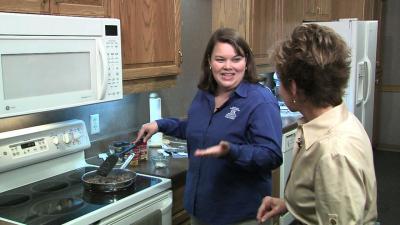"How can we eat healthy and stay within our food budget?" is the question we are often asked in today's economy. Researchers say it take three things to be well nourished: knowledge, money and time. When money is limited, we need to use our knowledge and time to find ways to reduce food cost without sacrificing nutrition...not only at the grocery store, but within our kitchens as well. This month on "Its About You", Mindy McCulley, Barren Co Family & Consumer Science Agent shows us how to find the best food bargains in town and save money on those daily "hidden food costs".

Core Messages:
- The first step in managing our food budget for the healthiest return starts at home. Spend a little time each week planning your meals (at and away from home) by looking in your pantry or freezer, reviewing grocery store sales and coupons, checking on seasonal food availability and reviewing favorite recipes and menus.
- When grocery shopping, look for store specials and buying items in bulk, such as dried beans to save money. Remember using coupons are only a savings if the final cost of the item is less expensive than a competitive or store brand.
- The venue where you purchase food also affects your food budget. Typically grocery stores and large discount stores will provide the best value for the dollar, but perishable items such as milk, bread or eggs can offer be purchased at pharmacy type stores at or below the grocery store cost.
- Honing your cooking skills is a major factor in saving money on food. Buying ground beef or chicken and preparing it at home, rather than picking up similar items at a quick service restaurant can be just as quick and is more economical and healthier.
- Tips for fixing quick meals at home include cooking fresh or frozen vegetables in the microwave; using canned beans for quick salads, side dishes or entrees; making multiple dishes from one cut of meat and freeze extras for future meal.
- Grocery bills are not the only culprit contributing to food cost woes. Look at the hidden costs of eating meals or snacks "on the run" during the work day. Healthy breakfast, lunch and snacks can be packed safety in the various insulated containers for quick meals at half the cost.
- Portable breakfast ideas include: a blend of oatmeal, raisins and walnuts in a plastic bag for fixing in a microwave at work, yogurt, peanut butter on whole wheat bread or crackers, and fruit. Lunch ideas include sandwiches of all types on whole wheat bread, fresh vegetable and fruits, bean salads, fruit cups, string cheese, cottage cheese and fruit. For snacks, travel with packages of low calorie hot chocolate mix, mini bags of low fat microwave popcorn or homemade trail mix( dried fruit with nuts, cereals and few chocolate chips).
- Planning ahead and buying only the quantity of food that the family will eat in a specific time frame will help to prevent food waste...and save money. Eating healthy on a budget is possible with planning, preparation and packing meals for work and play.
